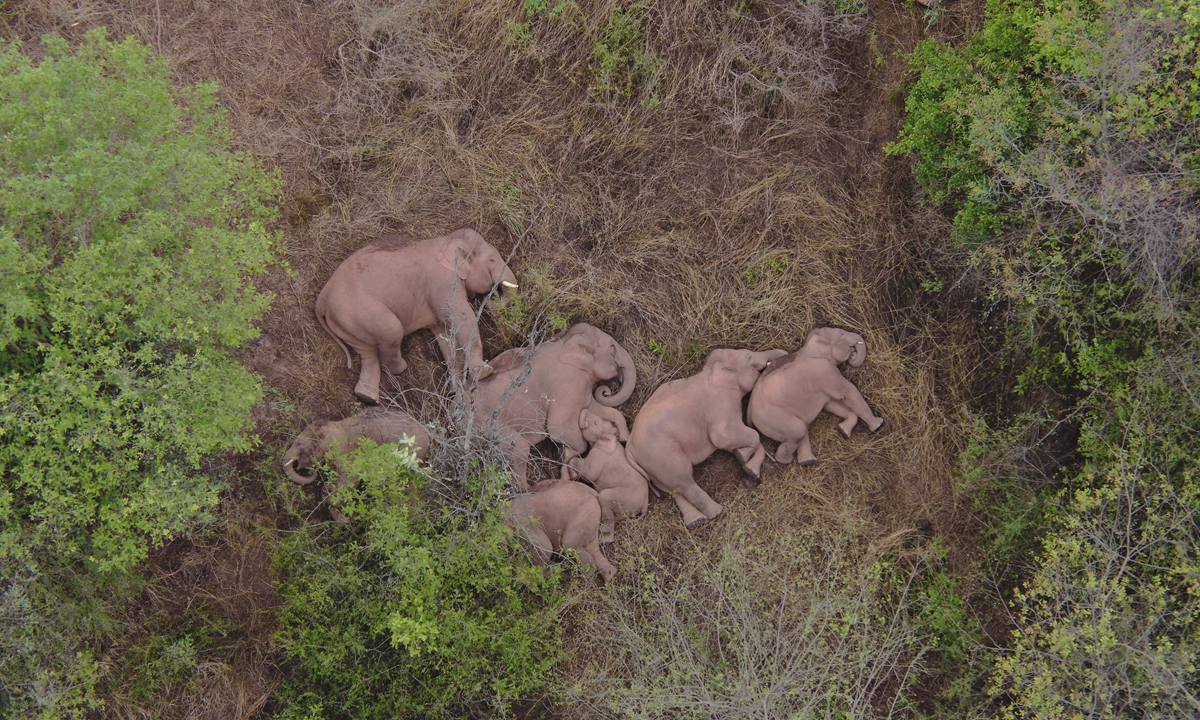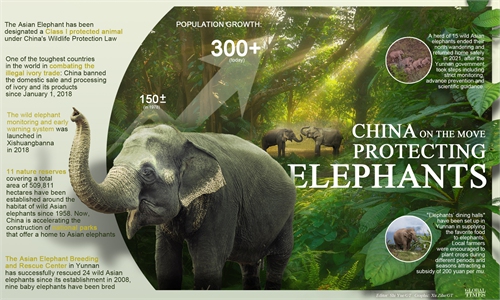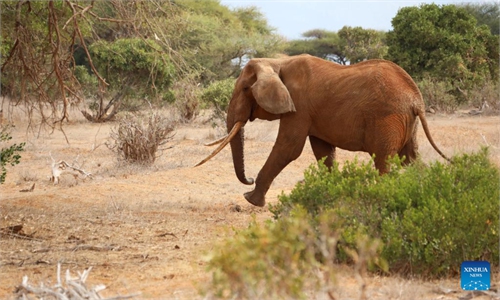Elephant ‘baby boom’ shows China's robust protection of mammoth stars after legendary journey in 2021

The elephants take a nap during their trip in Southwest China's Yunnan Province. Photo: courtesy of Yunnan forest fire brigade
The Chinese public marked the World Elephant Day on Friday by learning everything about the animal, including their intelligence and their endangered status, calling for more efforts to protect the smart yet mammoth species, highlighting growing awareness among the Chinese public about the animal following the high-profile journey of the wandering herd of Asian elephants last year.
Such growing public awareness accelerated the implementation of more elephant protection measures, including habitats restoration and studies on species, and the results are promising — elephants in Yunnan are seeing a baby boom, protectors said.
There are roughly 360 wild Asian elephants in Yunnan, a sharp increase from the 293 in 2018, media reported. Zhang Sijie, a forest firefighter and elephant tracker in Yunnan, told the Global Times on Friday the two newborns the migrated herd received during the journey are now chubby and healthy, and the herd welcomed another newborn this year.
Chinese social media users woke up on Friday to see hashtags including "Elephants have more than two teeth" "Asian elephants are rare than giant pandas" "Why elephants' droppings so light" on the hot search list on Sina Weibo.
In one video by a Sichuan-based news outlet, protectors revealed that elephants' droppings are of plant fibers and therefore light and not smelly. "It is an ideal souvenir, unique and portable," one Weibo user said jokingly.
Under a post introducing elephants' smartness and good memory, another user wrote "they can score high if there is an exam for animals."
"It must be heartbreaking for such a clever animal to witness its pal being poached. No wonder some suffered posttraumatic stress syndrome after that." "Only elephants need tusks. No buying, no killing" are typical online posts.
The public also get to know that an adult Asian elephant can eat grass or straws that can feed a goat four months, and they love mud baths to put on sunscreen and "talk" to each other with noses.

Protecting elephants, China on the move Graphic:Xu Zihe/GT
Besides posts promoting knowledge about the animal, there are also broad public appeals calling for refusal to tusk products and animal performance, a strong sense of love for elephants and caring for their future can be seen on Chinese social media, "thanks to the legendary odyssey with global attention," said Yang Yuming, a professor at the Yunnan Academy of Forestry and Grassland and a member of China's Endangered Species Scientific Commission.
Yang told the Global Times on Friday that a recent evaluation found the migrated herd is in good conditions in their original habitat in Xishuangbanna, Yunnan. "Their round trip has largely boosted public awareness of protection and accelerated the implementation of a range of protection methods," Yang said.
One of the major threats elephants face is human-elephant conflicts, which usually end up with injuries or even deaths on either side. But last year's legendary odyssey has offered valuable experience in preventing such scenarios through monitoring, alerting and public education and proved "human beings and this mammoth animal can co-exist in harmony," Yang noted.
Drones meant to track bushfires are now widely used to track elephants, so that local governments and villagers are informed of elephants' presence. They can also help guide elephants toward safer routes, Yunnan-based protector Zhang Xiong told the Global Times.
The odyssey was an important moment in ecological education, as elephants become "friends" with emotions and witness rather than a symbol as victims of poaching, elephant tracker Zhang Sijie said.
After the epic journey, "elephant canteens" were established — farmers are subsidized to cultivate food plants for elephants, such as corns and bananas. They can get compensation if the elephants eat the plants and harvest them if the animals don't.
Protectors also pushed for the restoration of ecological corridors to connect scattered habitats so that different elephant families can contact each other, and compiled guidelines on baby care, monitoring and the rescue of Asian elephants, Yang explained. Some of the latest progress was largely accelerated through wider awareness of protection.
Over the past few years, protection of elephants is increasingly a national push rather than a local one in Yunnan, Yang said, hailing ongoing co-managed national park plan, which can enlarge protection areas, transform farmers into protectors and reduce the risks of human-elephant conflicts.
Zhang Sijie also noted when the habitats for elephants were well preserved, not only the mammoth beasts but also many other wildlife can benefit from it.



